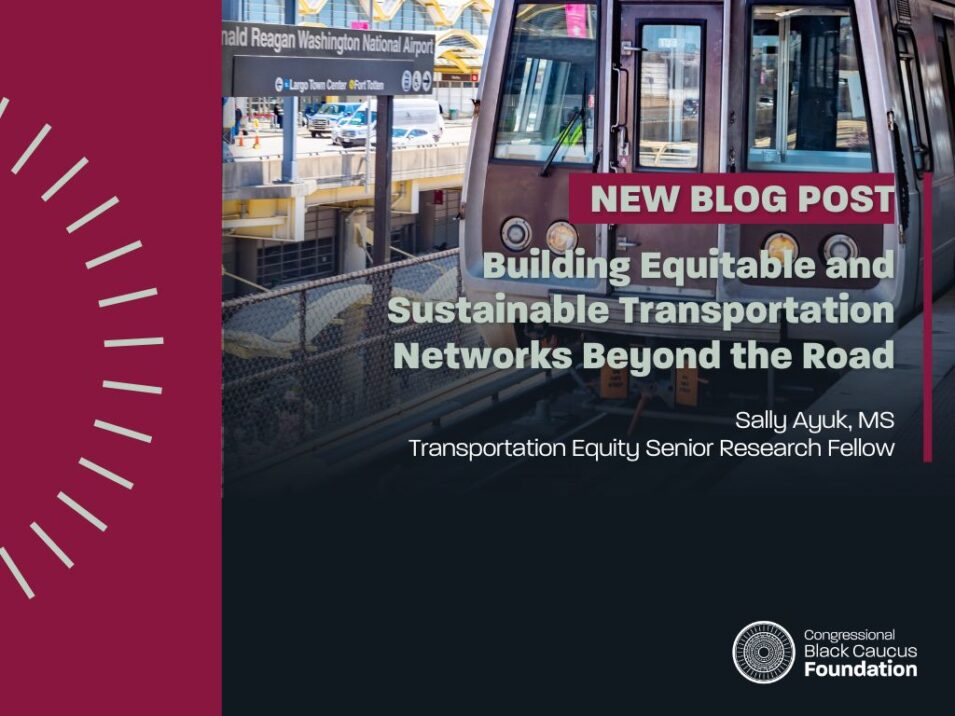By: Sally Ayuk – Transportation Equity Senior Research Fellow, Center for Policy Analysis and Research, CBCF
The Infrastructure Investment and Jobs Act (IIJA), also known as the Bipartisan Infrastructure Law (BIL), was signed into law by President Biden on November 15, 2021. This historic legislation authorizes $1.2 trillion over five years to improve and modernize critical infrastructure across the United States, including major financing to the Department of Transportation (DOT) to promote active transportation projects. Hailed as the largest investment in public transit in U.S. history, the law comes at a time when many Black Americans do not have access to connected active transportation networks, which are critical for over half of all trips under three miles. Grants from the IIJA should be directed towards initiatives that specifically target the racial gaps in active transportation, thereby enhancing safety and accessibility for Black communities while simultaneously reducing carbon emissions.
Research suggests distinct tendencies across racial groups, with White people engaging in more walking and cycling activities than Black people. Financial considerations associated with active mobility highlight additional racial disparities, with 53.52% of Black Americans recognizing travel as a financial burden. The differences extend to leisure-time physical activity participation, with 38% of non-Hispanic Black women reporting little or no participation, compared to 23% of non-Hispanic White women, contributing to growing health disparities for Black people.
When it comes to health disparities, air pollution plays a major role. Black people have an 18-point greater exposure score than White people. Nationally, Black people living below the poverty level endure slightly worse air pollution. Black residents in southern states like Alabama, Georgia, and Louisiana have the highest exposure index, while those in Wyoming and Hawaii have the lowest. When it comes to addressing these disparities, raising awareness and implementing targeted interventions will help ensure equitable access to clean air and safeguard public health for all communities.
Under the Bipartisan Infrastructure Act, annual funding for the Recreational Trails Program (RTP) remains at $84 million per year for states to create and maintain recreational trails for non-motorized and motorized sports. The Safe Streets and Roads for All (SS4A) program is authorized for $1 billion in competitive awards annually through FY 2026. Although there is no statutory minimum or maximum, award sizes in fiscal year 2024 are projected to range from $100,000 to $25 million, depending on the scope. The Active Transportation Infrastructure Investment Program (ATIIP), a competitive grant effort for building safe and integrated transportation infrastructure within active transportation networks, awarded the Federal Highway Administration (FHWA) $45 million in 2023. USDOT offers three grant types totaling $1.785 billion under the Reconnecting Communities and Neighborhoods (RCN) Program to fund initiatives that promote walkability, safety, and affordable transit access.
We must not let this moment pass us by. The Department of Transportation (DOT), State, and local and regional governmental organizations must harness available funding and programs for active transportation to build a comprehensive database comparable to those for roads, highways, and bridges. These agencies must prioritize the development of cohesive, active transportation systems and promote sustainable travel options. Creating a readily accessible and extensive active mobility database is fundamental for making informed decisions and advancing mobility in this critical domain.
On May 28th, 2024, the Congressional Black Caucus Foundation’s Center for Policy Analysis and Research is hosting a Transportation Equity Hill Briefing to engage participants in a vital conversation regarding the benefits of active transportation in Black communities. This event will delve into the benefits of grant funding options for expanding active transportation provided by the Infrastructure Investment and Jobs Act (IIJA). Together we prioritize and support active transportation to reduce racial disparities and carbon emissions in the transportation sector.
Click here to RSVP for the Transportation Equity Hill Briefing.
Click here to read Sally Ayuk’s latest policy brief, “Walking the Talk: Empowering Black Communities through Inclusive Active Transportation.”
